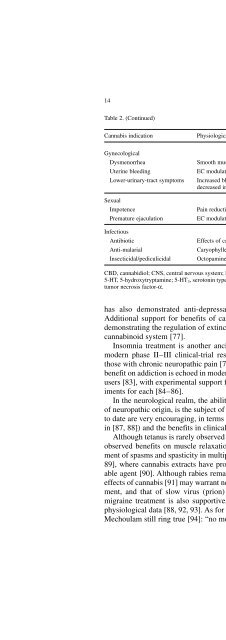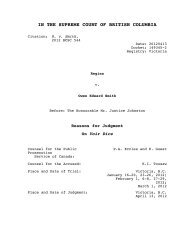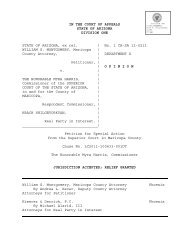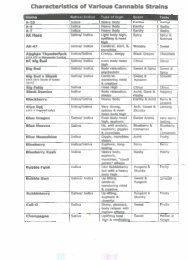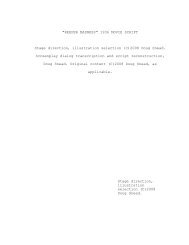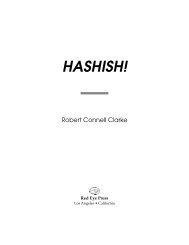- Page 2: (( 3. Umbruch 4.4..2005 ))
- Page 6: Cannabinoids as Therapeutics Edited
- Page 10: Contents List of contributors . . .
- Page 14: List of contributors Itai A. Bab, B
- Page 18: Preface Twenty years ago the endoca
- Page 22: Cannabinoids as Therapeutics Edited
- Page 26: Cannabis in India: ancient lore and
- Page 30: Cannabis in India: ancient lore and
- Page 34: Cannabis in India: ancient lore and
- Page 38: Cannabis in India: ancient lore and
- Page 42: Cannabis in India: ancient lore and
- Page 46: Cannabis in India: ancient lore and
- Page 52: 16 E. Russo Hemorrhoids continue to
- Page 56: 18 E. Russo 2 Merlin MD (2003) Arch
- Page 60: 20 E. Russo 63 Karnick CR (1996) Ay
- Page 64: 22 E. Russo medical use of cannabis
- Page 68: 24 L.O. Hanusˇ and R. Mechoulam In
- Page 72: 26 L.O. Hanusˇ and R. Mechoulam wh
- Page 76: 28 L.O. Hanusˇ and R. Mechoulam we
- Page 80: 30 L.O. Hanusˇ and R. Mechoulam St
- Page 84: 32 L.O. Hanusˇ and R. Mechoulam (R
- Page 88: 34 L.O. Hanusˇ and R. Mechoulam St
- Page 92: 36 L.O. Hanusˇ and R. Mechoulam No
- Page 96: 38 L.O. Hanusˇ and R. Mechoulam St
- Page 100:
40 L.O. Hanusˇ and R. Mechoulam St
- Page 104:
42 L.O. Hanusˇ and R. Mechoulam of
- Page 108:
44 L.O. Hanusˇ and R. Mechoulam Ku
- Page 112:
46 M. Maccarrone 117 Huffman JW, Ze
- Page 116:
48 R.G. Pertwee ed that, in contras
- Page 120:
50 R.G. Pertwee rats and mice at do
- Page 124:
52 R.G. Pertwee prevent petit mal e
- Page 128:
54 R.G. Pertwee Neurotoxicity As di
- Page 132:
56 R.G. Pertwee Table 3. Anti-infla
- Page 136:
58 R.G. Pertwee followed by sleep,
- Page 140:
60 R.G. Pertwee or cancer against w
- Page 144:
62 R.G. Pertwee cannabidiol with ph
- Page 148:
64 R.G. Pertwee choactivity. In: DJ
- Page 152:
Cannabinoids as Therapeutics Edited
- Page 156:
Endocannabinoids and regulation of
- Page 160:
Endocannabinoids and regulation of
- Page 164:
Endocannabinoids and regulation of
- Page 168:
Endocannabinoids and regulation of
- Page 172:
Endocannabinoids and regulation of
- Page 176:
Cannabinoids as Therapeutics Edited
- Page 180:
Cannabinoids in neurodegeneration a
- Page 184:
Cannabinoids in neurodegeneration a
- Page 188:
Cannabinoids in neurodegeneration a
- Page 192:
Cannabinoids in neurodegeneration a
- Page 196:
Cannabinoids in neurodegeneration a
- Page 200:
Cannabinoids in neurodegeneration a
- Page 204:
Cannabinoids in neurodegeneration a
- Page 208:
Cannabinoids in neurodegeneration a
- Page 212:
Cannabinoids in neurodegeneration a
- Page 216:
Cannabinoids in neurodegeneration a
- Page 220:
Cannabinoids in neurodegeneration a
- Page 224:
Cannabinoids in neurodegeneration a
- Page 228:
Cannabinoids in neurodegeneration a
- Page 232:
Cannabinoids in neurodegeneration a
- Page 236:
Cannabinoids in neurodegeneration a
- Page 240:
112 S.A. Varvel and A.H. Lichtman a
- Page 244:
114 S.A. Varvel and A.H. Lichtman T
- Page 248:
116 S.A. Varvel and A.H. Lichtman c
- Page 252:
118 S.A. Varvel and A.H. Lichtman A
- Page 256:
120 S.A. Varvel and A.H. Lichtman T
- Page 260:
122 S.A. Varvel and A.H. Lichtman p
- Page 264:
124 S.A. Varvel and A.H. Lichtman n
- Page 268:
126 S.A. Varvel and A.H. Lichtman e
- Page 272:
128 S.A. Varvel and A.H. Lichtman m
- Page 276:
130 S.A. Varvel and A.H. Lichtman b
- Page 280:
132 S.A. Varvel and A.H. Lichtman C
- Page 284:
134 S.A. Varvel and A.H. Lichtman a
- Page 288:
136 S.A. Varvel and A.H. Lichtman 8
- Page 292:
138 S.A. Varvel and A.H. Lichtman u
- Page 296:
140 S.A. Varvel and A.H. Lichtman d
- Page 300:
142 R.E. Musty Since the discovery
- Page 304:
144 R.E. Musty effects. Low doses s
- Page 308:
146 R.E. Musty Discussion The data
- Page 312:
Cannabinoids as Therapeutics Edited
- Page 316:
Cannabinoid targets for pain therap
- Page 320:
Cannabinoid targets for pain therap
- Page 324:
Cannabinoid targets for pain therap
- Page 328:
Cannabinoid targets for pain therap
- Page 332:
Cannabinoid targets for pain therap
- Page 336:
Cannabinoid targets for pain therap
- Page 340:
Cannabinoid targets for pain therap
- Page 344:
Cannabinoids as Therapeutics Edited
- Page 348:
Potential use of cannabimimetics in
- Page 352:
Potential use of cannabimimetics in
- Page 356:
Potential use of cannabimimetics in
- Page 360:
Potential use of cannabimimetics in
- Page 364:
Potential use of cannabimimetics in
- Page 368:
Potential use of cannabimimetics in
- Page 372:
Potential use of cannabimimetics in
- Page 376:
Potential use of cannabimimetics in
- Page 380:
184 L.A. Parker et al. 5-HT 3 antag
- Page 384:
186 L.A. Parker et al. ing nausea,
- Page 388:
188 L.A. Parker et al. Cats and dog
- Page 392:
190 L.A. Parker et al. [27] indicat
- Page 396:
192 L.A. Parker et al. Anecdotal ev
- Page 400:
194 L.A. Parker et al. specific to
- Page 404:
196 L.A. Parker et al. References 1
- Page 408:
198 L.A. Parker et al. 45 Mechoulam
- Page 412:
200 L.A. Parker et al. norvegicus d
- Page 416:
202 I.A. Bab signaling [20, 21] as
- Page 420:
204 I.A. Bab cular and cellular bio
- Page 424:
206 I.A. Bab 39 Iuliano-Burns S, Mi
- Page 428:
208 D. Parolaro and T. Rubino (Amer
- Page 432:
210 D. Parolaro and T. Rubino addic
- Page 436:
212 D. Parolaro and T. Rubino Condi
- Page 440:
214 D. Parolaro and T. Rubino plete
- Page 444:
216 D. Parolaro and T. Rubino prote
- Page 448:
218 D. Parolaro and T. Rubino Exp T
- Page 452:
220 F. Barth and M. Rinaldi-Carmona
- Page 456:
222 F. Barth and M. Rinaldi-Carmona
- Page 460:
224 F. Barth and M. Rinaldi-Carmona
- Page 464:
226 F. Barth and M. Rinaldi-Carmona
- Page 468:
228 F. Barth and M. Rinaldi-Carmona
- Page 472:
230 F. Barth and M. Rinaldi-Carmona
- Page 476:
232 G.W. Guy and C.G. Stott However
- Page 480:
234 G.W. Guy and C.G. Stott In the
- Page 484:
236 G.W. Guy and C.G. Stott ∆ 9 -
- Page 488:
238 G.W. Guy and C.G. Stott Figure
- Page 492:
240 G.W. Guy and C.G. Stott For the
- Page 496:
242 G.W. Guy and C.G. Stott Figure
- Page 500:
244 G.W. Guy and C.G. Stott oxide,
- Page 504:
246 G.W. Guy and C.G. Stott Ireland
- Page 508:
248 G.W. Guy and C.G. Stott Figure
- Page 512:
250 G.W. Guy and C.G. Stott Figure
- Page 516:
252 G.W. Guy and C.G. Stott Table 2
- Page 520:
254 G.W. Guy and C.G. Stott of the
- Page 524:
256 G.W. Guy and C.G. Stott reactio
- Page 528:
258 G.W. Guy and C.G. Stott Figure
- Page 532:
260 G.W. Guy and C.G. Stott easily
- Page 536:
262 G.W. Guy and C.G. Stott 40 Walt
- Page 540:
Index AA-5-HT 156 absent-mindedness
- Page 544:
Index 267 cannabinoid agonist 190,
- Page 548:
Index 269 HU-210 93, 95, 142, 153,
- Page 552:
Index 271 oxidative cell death 84 o


